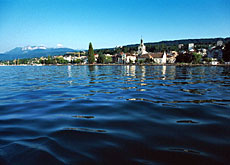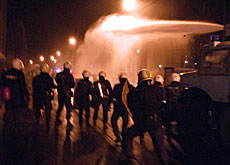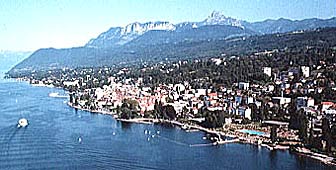G-8 Summit in Evian: Lessons from Davos

Following the anti-WEF demonstrations in Davos and the riots in Bern, the next confrontation between globalisation critics and the Swiss authorities is set for June.
This is when a G-8 summit will take place on the shores of Lake Geneva. Both sides have spoken out on the issue.
The three-day meeting, between the world’s seven most industrialised nations and Russia, will take place from June 1-3.
The French resort of Evian-les-Bains was selected to host the summit because of its remote and relatively secure location.
However, officials from the Lake Geneva region fear it will provoke violent protests on Swiss soil.
Protest hub
Located less than 50 kilometres from the summit venue, the Swiss city of Geneva is expected to serve as the main transit point for the G-8 participants, as well as anti-globalisation campaigners.
However, on Monday, representatives of canton Vaud’s anti-globalisation group said they were considering the Swiss city of Lausanne as an “ideal” location to stage their demonstrations.
“Lausanne is directly across the lake from Evian, just 12 kilometres away,” said Josef Zisyadis, a member of the House of Representatives and an anti-globalisation supporter.
“It would be a natural choice and it would also give the city a different image than that of the home to the International Olympic Committee.”
At a press conference in Lausanne on Monday, officials from cantons Geneva, Valais and Vaud – the three areas likely to be affected by the summit – made it clear that violent protests would not be welcome in Switzerland.
“Lausanne does not have the infrastructure to handle 100,000 protestors,” said Jean-Claude Mermoud, a member of Switzerland’s G-8 coordination task force.
“We do not want, and are not ready, to handle a gathering of that magnitude,” added Police Commander, Alain Bergonzoli.
Special training
Bergonzoli said Swiss security forces were receiving special training on how to avoid violent confrontation, including crowd control measures.
“We must take the time to train our officers to prevent the kind of violence that was seen in Genoa,” he told swissinfo.
“But if we find ourselves in a worst-case scenario, when tensions are running high, the police will be obliged to take certain measures, even if they seem exaggerated.”
Concerns have also been expressed that Geneva – which is home to a host of international organisations including the United Nations – may become a target for terrorists because of its proximity to the summit.
“It must be said that everything can be a target of terrorism and we have to live with that,” said Aepli.
“But there are many measures which will be taken, involving air and ground security forces, which will take these threats into consideration.”
Friendly dialogue
Swiss officials said they were working with the federal government and French authorities to come up with a strategy to ensure the safety of G-8 participants, as well as residents in Switzerland.
The additional security measures are expected to cost at least SFr40 million ($29.5 million) and the cantons have asked the federal government and the French authorities to help foot the bill.
Officials in both countries hope to avoid the kind of violence seen in Bern over the past weekend, as well as at the 2001 G-8 summit in Genoa, Italy, during which a 23-year-old protester was shot dead by police.
According to Pierre Aepli, the head of the Swiss coordination task force, the authorities want to establish a constructive dialogue with anti-globalisation groups, which will allow for peaceful demonstrations.
“We hope to fix certain rules,” he told swissinfo, “but it takes two to tango and these groups need to be willing to respect those rules.”
Positive impact
Besides being a potential hub for protest activities, Lausanne will also play host to heads of state from around a dozen developing nations during the summit.
The French government has invited these countries to take part in some of the G-8 discussions and Lausanne was selected as the venue for a set of parallel meetings.
According to Aepli, Switzerland was keen to facilitate contact between world leaders and representatives from developing countries.
“For the first time, these nations will have the opportunity to make their voices heard at the summit,” he told swissinfo.
“Switzerland’s backing of these events highlights our role in making it easier for nations to come together.”
He also pointed out that Switzerland’s hotel industry was likely to benefit from the number of politicians and journalists who are expected to stay over in Lausanne and Geneva during the summit.
swissinfo, Anna Nelson in Geneva
Around 7,000 politicians and journalists are expected to take part in the G-8 Summit in Evian, from June 1-3.
The French alpine resort is located less than 50 kilometres from Geneva.
Some 100,000 anti-globalisation protestors are expected to converge on the Lake Geneva area during the meeting.
Swiss authorities fear the summit will spark violent protests in the cities of Lausanne and Geneva.
Extra security measures are expected to cost at least SFr40 million ($29.5 million).
French President, Jacques Chirac, asked Switzerland for logistical help in organising the event.

In compliance with the JTI standards
More: SWI swissinfo.ch certified by the Journalism Trust Initiative


You can find an overview of ongoing debates with our journalists here. Please join us!
If you want to start a conversation about a topic raised in this article or want to report factual errors, email us at english@swissinfo.ch.